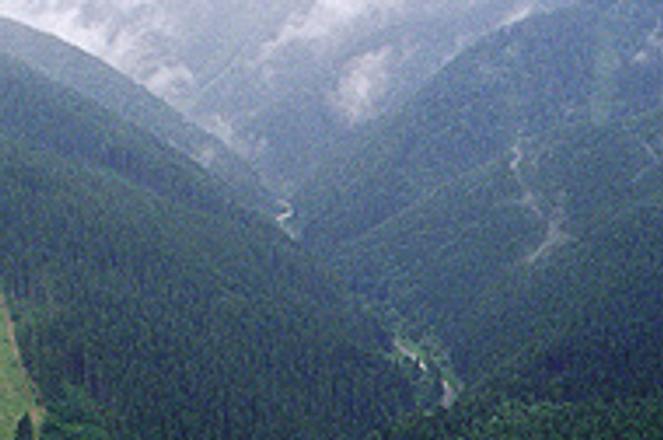THE AIR was fresh, the wolves polite.photo: Chris Togneri
SLOVAKIA is lucky to produce a very special commodity, and the state's guests and citizens are even luckier to get it for free; fresh air.
The air (vzduch) is something that Slovaks are keen to comment on. In conversations about the various qualities of the wild corners of their country, it is inevitable that they tell you which places have úžasný vzduch (lovely air), and are even ready to tell you where it is the best.
There is much to be said. In wet weather, for example, the vzduch changes tangibly. Before a summer storm, it is dusno - the air becomes heavy with moisture that announces the coming rain. After the storm has passed, mist (hmla) sits low on the rivers and rises slowly out of the valleys.
Even after the sun returns, last fall's leaves (listy) stay moist under the shadow of the trees. They are soft (mäkký) to the foot and release a rich, rotten (hnilý) scent full of the life of the outdoors.
As it has been a rainy summer this year, the mud in the mountains has been its own special sight. Most memorable was one of my first hikes this year, in May. Crossing what I thought was a bit of a puddle spilling slowly over the trail, I sank ankle deep in fine silt that had only pretended to be dry land. After a more careful look around I found that the entire area was a kind of lagoon. Trying to dance around it was no use - the only option was to slop on forward.
Perhaps I was asking for it by heading out so early in the season when the snow was still melting. But even now, in the beginning of July, Slovakia is a wet place. Hiking in the Malá Fatra mountains with a group of Slovaks, many varieties of slippery mud (šmykľavé blato) adorned the trail as well as our boots and, occasionally, my hands.
But a bit of mud must be taken in stride, even if it is not overcome delicately. Once the ground dried out a bit, we had time to look up and think about the heights ahead and just how far we had to šľiapať (tread), a word that puts me in mind of the English schlep. As one or the other slowed down or tired out, a gentle "šup, šup" encouraged us to carry on.
In my more worn-out moments I was tempted to ask those coming toward me down the trail how far it was to the next peak, hoping that they would tell me "iba kúsok" ("just a little bit") or "iba skok" ("just a hop"). Usually, however, I let them pass with only the traditional ahoj.
When we did reach stopping points, I used those moments to stretch (pretiahnuť sa). Though this elicited some giggles and light jokes, I was also commended for my fight against svalovica, or soreness.
Some of my companions have even begun to give stretching a try. In exchange, I received a bit of outdoorsy health advice - how to avoid "getting the wolf" ("dostať vlka").
The Slovaks I have interviewed disagree about what this actually means. One even responded "to nikto nevie" - nobody knows. The majority told me it is equivalent to a chafed bottom (zaparený zadok). Others said their mothers used the expression to warn them against "catching cold" in a sensitive part of their body. In the end, I came to the opinion that it is probably better not to know.
Luckily, it was not so wet that the wolf caught any of us. In fact, the only šelmy, or beasts, we happened across were a garter snake and a few goats. Otherwise we were alone with the fresh air.


